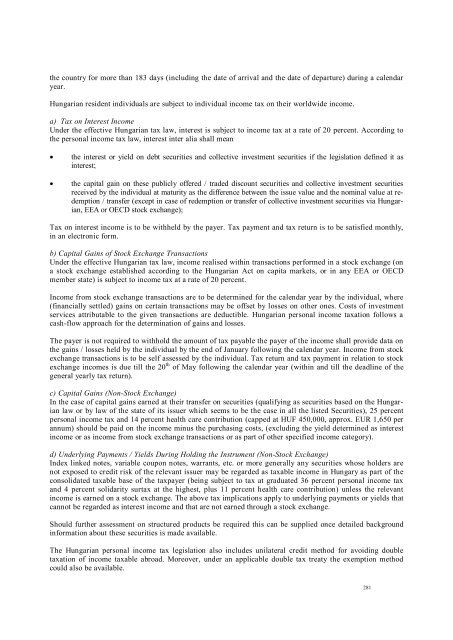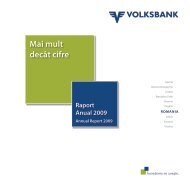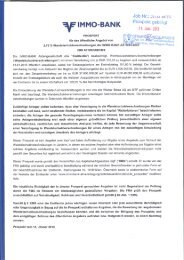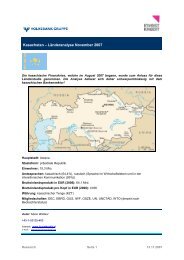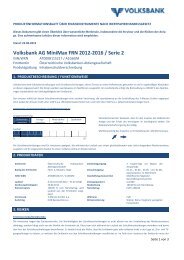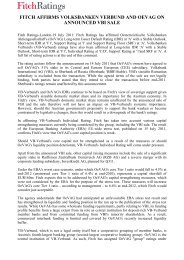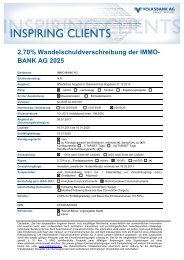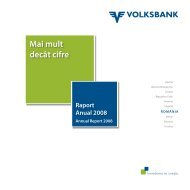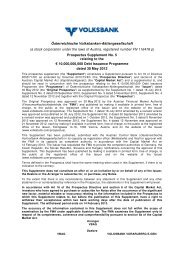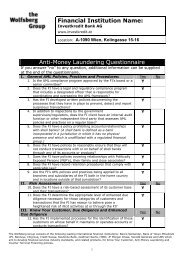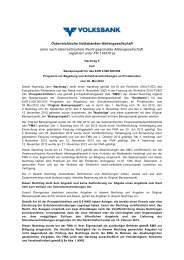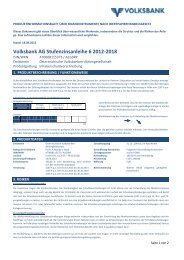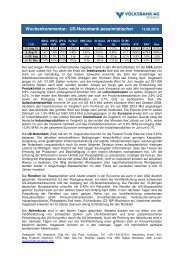I This document constitutes the base prospectus of ... - Volksbank AG
I This document constitutes the base prospectus of ... - Volksbank AG
I This document constitutes the base prospectus of ... - Volksbank AG
Create successful ePaper yourself
Turn your PDF publications into a flip-book with our unique Google optimized e-Paper software.
<strong>the</strong> country for more than 183 days (including <strong>the</strong> date <strong>of</strong> arrival and <strong>the</strong> date <strong>of</strong> departure) during a calendar<br />
year.<br />
Hungarian resident individuals are subject to individual income tax on <strong>the</strong>ir worldwide income.<br />
a) Tax on Interest Income<br />
Under <strong>the</strong> effective Hungarian tax law, interest is subject to income tax at a rate <strong>of</strong> 20 percent. According to<br />
<strong>the</strong> personal income tax law, interest inter alia shall mean<br />
<strong>the</strong> interest or yield on debt securities and collective investment securities if <strong>the</strong> legislation defined it as<br />
interest;<br />
<strong>the</strong> capital gain on <strong>the</strong>se publicly <strong>of</strong>fered / traded discount securities and collective investment securities<br />
received by <strong>the</strong> individual at maturity as <strong>the</strong> difference between <strong>the</strong> issue value and <strong>the</strong> nominal value at redemption<br />
/ transfer (except in case <strong>of</strong> redemption or transfer <strong>of</strong> collective investment securities via Hungarian,<br />
EEA or OECD stock exchange);<br />
Tax on interest income is to be withheld by <strong>the</strong> payer. Tax payment and tax return is to be satisfied monthly,<br />
in an electronic form.<br />
b) Capital Gains <strong>of</strong> Stock Exchange Transactions<br />
Under <strong>the</strong> effective Hungarian tax law, income realised within transactions performed in a stock exchange (on<br />
a stock exchange established according to <strong>the</strong> Hungarian Act on capita markets, or in any EEA or OECD<br />
member state) is subject to income tax at a rate <strong>of</strong> 20 percent.<br />
Income from stock exchange transactions are to be determined for <strong>the</strong> calendar year by <strong>the</strong> individual, where<br />
(financially settled) gains on certain transactions may be <strong>of</strong>fset by losses on o<strong>the</strong>r ones. Costs <strong>of</strong> investment<br />
services attributable to <strong>the</strong> given transactions are deductible. Hungarian personal income taxation follows a<br />
cash-flow approach for <strong>the</strong> determination <strong>of</strong> gains and losses.<br />
The payer is not required to withhold <strong>the</strong> amount <strong>of</strong> tax payable <strong>the</strong> payer <strong>of</strong> <strong>the</strong> income shall provide data on<br />
<strong>the</strong> gains / losses held by <strong>the</strong> individual by <strong>the</strong> end <strong>of</strong> January following <strong>the</strong> calendar year. Income from stock<br />
exchange transactions is to be self assessed by <strong>the</strong> individual. Tax return and tax payment in relation to stock<br />
exchange incomes is due till <strong>the</strong> 20 th <strong>of</strong> May following <strong>the</strong> calendar year (within and till <strong>the</strong> deadline <strong>of</strong> <strong>the</strong><br />
general yearly tax return).<br />
c) Capital Gains (Non-Stock Exchange)<br />
In <strong>the</strong> case <strong>of</strong> capital gains earned at <strong>the</strong>ir transfer on securities (qualifying as securities <strong>base</strong>d on <strong>the</strong> Hungarian<br />
law or by law <strong>of</strong> <strong>the</strong> state <strong>of</strong> its issuer which seems to be <strong>the</strong> case in all <strong>the</strong> listed Securities), 25 percent<br />
personal income tax and 14 percent health care contribution (capped at HUF 450,000, approx. EUR 1,650 per<br />
annum) should be paid on <strong>the</strong> income minus <strong>the</strong> purchasing costs, (excluding <strong>the</strong> yield determined as interest<br />
income or as income from stock exchange transactions or as part <strong>of</strong> o<strong>the</strong>r specified income category).<br />
d) Underlying Payments / Yields During Holding <strong>the</strong> Instrument (Non-Stock Exchange)<br />
Index linked notes, variable coupon notes, warrants, etc. or more generally any securities whose holders are<br />
not exposed to credit risk <strong>of</strong> <strong>the</strong> relevant issuer may be regarded as taxable income in Hungary as part <strong>of</strong> <strong>the</strong><br />
consolidated taxable <strong>base</strong> <strong>of</strong> <strong>the</strong> taxpayer (being subject to tax at graduated 36 percent personal income tax<br />
and 4 percent solidarity surtax at <strong>the</strong> highest, plus 11 percent health care contribution) unless <strong>the</strong> relevant<br />
income is earned on a stock exchange. The above tax implications apply to underlying payments or yields that<br />
cannot be regarded as interest income and that are not earned through a stock exchange.<br />
Should fur<strong>the</strong>r assessment on structured products be required this can be supplied once detailed background<br />
information about <strong>the</strong>se securities is made available.<br />
The Hungarian personal income tax legislation also includes unilateral credit method for avoiding double<br />
taxation <strong>of</strong> income taxable abroad. Moreover, under an applicable double tax treaty <strong>the</strong> exemption method<br />
could also be available.<br />
281


